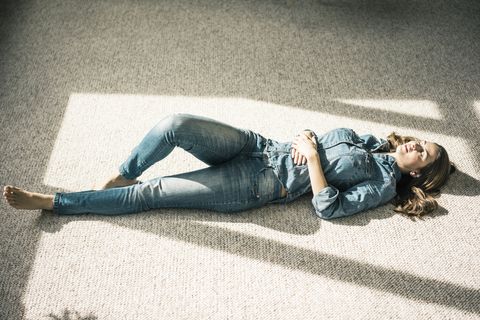
I’m pretty sure Drake spoke for the majority of people when he sang, “I only love my bed and my mom.” That’s because beds (and, yeah, moms) are freaking amazing—but it turns out some people are opting to do the whole sleeping thing, sans bed…on the floor.
Here’s the gist: Floor-sleeping enthusiasts claim that snoozing on a hard surface (i.e., your bedroom floor), is your best bet for optimal spine health, since research shows that’s the way our ancestors did it. (Think of it as paleo, but for sleeping.) But are those claims legit?
All right, is sleeping on the floor better for your back?
“Long term? No,” says Jennifer L. Solomon, M.D., a board-certified physiatrist at the Hospital for Special Surgery.
She adds, however, that in the short term, “sometimes people with acute pain find that different positions on a hard surface can ease some of their back pain.” This typically happens when people lie on the floor with their knees up, taking pressure off of their back, says Solomon.

This is also why some might say hard mattresses are best for back pain—but “everybody is different,” says Solomon. Yes, some people may benefit from a hard surface while others prefer something soft—but the only way you’ll really know which is best for you is to try it out yourself. It’s more about protecting your spine and spine alignment—something that means different things for everyone.
So how can I relieve my back pain…without sleeping on the floor?
Side and back sleepers can put a pillow behind or between their knees to achieve proper spinal alignment, Solomon says.
While you’re at it, nix the pile of pillows at bedtime—you only really need one or two–and make sure they’re not too fluffy and don’t prop your head up too much (that’s called forward flexion and can cause neck pain).

Something else to keep in mind: Pass on sleeping on your stomach—it puts more pressure on your spine, says Solomon, making it impossible for your spine to stay neutral.
But your sleeping position (and surface) aren’t the only things that impact your spine. According to Solomon, spine health is also determined by how much you exercise, how well you eat, and how you manage your stress. “There’s not one magic remedy,” Solomon says. “There are multiple factors that go into [spine health] and sleeping is just one aspect of it.”
The bottom line: Proper spine alignment is crucial to relieve back pain, but you may need to try different positions and sleeping surfaces to find out which one feels best for you.
Source: Read Full Article